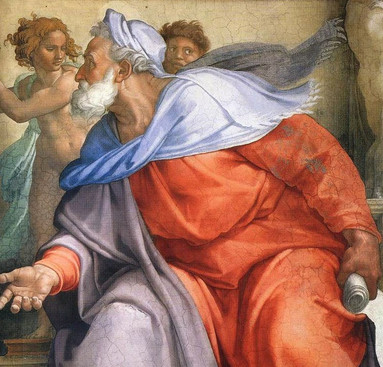The role of the prophet is about being chosen by God to be His instruments and witnesses, and about putting trust in His presence and power to accomplish that mission. We see three such prophets (Ezekiel, Paul and Jesus) who were rejected and scorned by their very own people for the message they brought. Ezekiel is among his own Jewish exiles, taken off by the Babylonians into captivity. Paul is defending himself and his ministry against those who doubt his authenticity and he is suffering "hardships, persecutions and constraints for the sake of Christ." Jesus is with his own people, in "his native place, accompanied by his disciples."
 The prophet is called to change the world by changing the hearts and minds of those living within it. This call is a radical and social response to life and God. To have a prophet in our midst is a favor, a sign of God's concern for us, a reminder that God will not leave us on our own for long, but will come looking for us.
The prophet is called to change the world by changing the hearts and minds of those living within it. This call is a radical and social response to life and God. To have a prophet in our midst is a favor, a sign of God's concern for us, a reminder that God will not leave us on our own for long, but will come looking for us.
The same God, who spoke to the exiles in Babylon through Ezekiel, who spoke to Paul in prison and who spoke through Jesus to the marginalized, reaches out to us in our own exile. He reaches out to us when we no longer feel "at home," when we are uncomfortable with all that is happening in our lives, making us feel like a stranger in our own mind or body. He calls to us when we have beliefs that cause us to be at odds with those closest to us, when we feel out of synch with our culture's values and practices, and when we long for the home that He has promised us. He urges us to cry out in His name when we tire of new reports of war, genocide, disease, poverty, inequality and divisions.
We are called, then, to be modern-day prophets, and as such, we are at once and forever at odds with the enemies of life - in whatever shape or form they take, however we experience them in our different cultures. To ignore them is to encourage them. To refuse to say 'No' to them, is to join them in their rejection of life's mysteries. Any commitment to an attitude that takes precedence over a commitment to life is a surrender of our spiritual life, because no matter where our exile, God is there speaking to us through the prophets - both ancient and modern-day.
As we celebrate our nation’s Day of Independence, we pray that God will not give up on us as a nation, for we, like the people of Ezekiel and Jesus’ times have a history of obstinacy and have not always provided space and a hearing for the prophets in our midst.
The example of faithfulness to God, the self-sacrificing and unconditional love for others, the patience in adversity, the spirit of concern and compassion for the poor and the powerless are the attitudes of mind and heart that make modern-day prophets. Like it or not, this is what we are all called to be. There is no containing the will of God. If we are waiting for God to speak to us in thunder and lightning displays, then we have a very long wait.
Prophet Ezekiel - Fresco from the Sistine Chapel ceiling by Michelangelo





